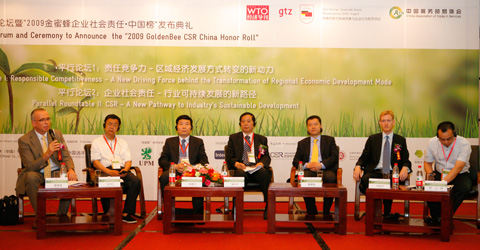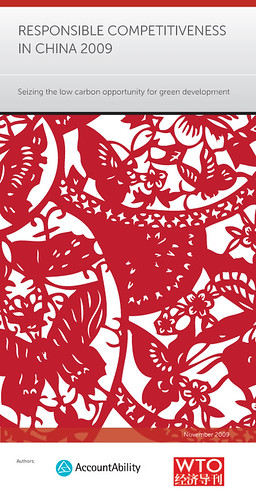June 5th, 2010 by JJW

Fifth annual Golden Bee Conference: Regional Responsible Competitiveness Panel, image courtesy of WTO Tribune
Here is a summary of my remarks at the fifth annual Golden Bee conference in Beijing, speaking on a panel about how governments, companies, and civil society are working together to shift markets to reward responsible business action and make development more sustainable.
The session was chaired by the head of the Sino-German CSR Project, Rolf Dietmer, and had representatives from four provincial and district CSR initiatives, including Shandong, Shanghai Pudong, Jiangsu and Sichuan, plus a representative form China Unicom. My work with Chinese provincial economics planners has centered on the textiles and medicines sectors in Zhejiang through Responsible Competitiveness work with AccountAbility.
WTO Tribune wrote an article here (“Government duty-bound “responsibility”….in Chinese: ??“?”???) about the session here and captured some of my main points, but which I summarize here. (The entire transcript of my remarks in Chinese can be found here.
My main points:
1) Shifting markets to reward responsible business action requires a level playing field that no single sector (civil society, government, or business) can provide;
2) Chinese government officials at the provincial level are unsurpassed globally in their level of innovation and activity to promote new ways ;
3) Each provincial system is unique and there is need for coordination amongst local governments, the center and international stakeholders;
4) This unique approach to promoting sustainable development is both an asset and a liability, because if Chinese stakeholders do not coordinate properly, their market signals will be ignored by international buyers, ie, Chinese standards may not be recognized;
5) Chinese government officials, working with businesses, and using the power of the government bureaucracy, the media and civil society to promote good company practices and punish the bad, have the chance to clarify the way voluntary sustainability standards (such as the SA8000, GRI, ISO, AA1000, CSC9000T, FSC, etc) mature at the national and international levels;
6) Rather than create additional hoops for companies to jump through, governments can achieve economic, social environmental objectives by leveraging existing market mechanisms such as voluntary sustainability standards.
I add a point 7) International voluntary sustainability standards systems should see the power of Chinese stakeholders to pick winning standards as a wake-up call to be more serious about engaging in China and as an opportunity to scale up the impacts of their standards, since China plays such an integral part in so many global supply chains.
December 25th, 2009 by JJW

On November 30, I joined colleagues at the EU China Business Summit in Nanjing, Jiangsu, which dovetailed with the EU-China political meeting.
That day in Nanjing, under support from the Sino-Swedish Corporate Social Responsibility cooperation, AccountAbility launched the report Responsible Competitiveness in China 2009: Seizing the low carbon opportunity for green development.
This from AccountAbility:
Businesses in China are increasingly working with government and civil society to shift markets to reward sustainable development. These responsible business practices are becoming more and more embedded in the country’s emerging green industrial policy and low carbon development pathways. In some areas, China is set to leapfrog into the elite group of global green innovators.
These are some of the highlights from the report ‘Responsible Competitiveness in China 2009: Seizing the low carbon opportunity for green development’, launched at the 5th annual EU-China Business Summit as part of the Swedish EU presidency on 30 November in Nanjing, China.
The analysis presented in this report shows that China is developing a distinctive low carbon, responsible pathway, namely that:
- Low carbon industrial policies offer Chinese businesses and consumers huge opportunities
- Responsible business ventures in China are now impacting global markets relaunching China’s brand
- Strong government leadership, incentives and supportive policies are playing key roles
The report was independently researched and written in a unique collaboration between AccountAbility and the China WTO Tribune, with support from the Sino-Swedish CSR Cooperation Project. Learn more about the report’s key findings.
The Joint Statement of the 12th EU-China Summit specifically “decided to strengthen high-level dialogue and exchanges between think-tanks from both sides, and to promote and support regular exchanges.” Read the Joint Statement in full. AccountAbility’s partnership with the China WTO Tribune is an example of this kind of knowledge and collaboration exchange.
November 18th, 2009 by JJW
 I took Obama’s visit as a chance to write about how company action should play a more prominent role in the trust building and competitiveness equation of the Sino-US relationship. My Guardian article, A green call to arms, (link to Chinese version here) centers on climate change. Meanwhile, my ChinaDialogue piece, Obama’s China moment (and the Chinese version) addresses wider issues of corporate social responsibility. I focus especially on sustainability standards and other global “rules of the game” that the US and Chinese governments should encourage companies to improve jointly.
I took Obama’s visit as a chance to write about how company action should play a more prominent role in the trust building and competitiveness equation of the Sino-US relationship. My Guardian article, A green call to arms, (link to Chinese version here) centers on climate change. Meanwhile, my ChinaDialogue piece, Obama’s China moment (and the Chinese version) addresses wider issues of corporate social responsibility. I focus especially on sustainability standards and other global “rules of the game” that the US and Chinese governments should encourage companies to improve jointly.
Guardian: A green call to arms (Chinese)
ChinaDialogue: Obama’s China moment (Chinese)
January 6th, 2008 by JJW
 This article is the result of many years of research with HIV prevention and anti-discrimination groups in my then-home of Shanghai. I had much help from people who choose to remain anonymous. Their stories and many more I hope to one day flush out in a book on the topic of modern gay rights in China.
This article is the result of many years of research with HIV prevention and anti-discrimination groups in my then-home of Shanghai. I had much help from people who choose to remain anonymous. Their stories and many more I hope to one day flush out in a book on the topic of modern gay rights in China.
My goal in writing this article was not to be provocative or overly political, but simply to bring to light one of the more mysterious episodes in modern Chinese gay history: simply, how and why a successful gay counseling and health hotline would suddenly cease operations. Copy is available electronically on many academic journal sites or directly upon request. (joshua *dot* wickerham *at* gmail *dot com).
In addition to my indebtedness to the people quoted in the article, special thanks goes to several friends at UCSD, Johns Hopkins, and the Princeton in Asia program who read drafts and made useful suggestions. These friends continue to play crucial roles with the Beijing CDC and the Clinton Foundation, and as a Fulbright Scholar. These friends are real heroes and inspire me as they continue working with this pandemic’s most stigmatized groups. I am also indebted to Bill Valentino, VP of Corporate Social Responsibility for Bayer China, who continues to lead the business case for HIV prevention, and Chung To of the Chi Heng Foundation, who remains a voice for Chinese gays and children orphaned by HIV/AIDS. Both provided last-mile support. Lastly, I owe a debt of gratitude to Jim Fallows of The Atlantic, who encouraged me to submit this work to The Harvard Gay & Lesbian Review (Now The G&L Review Worldwide) and to editor Richard Schneider, who improved the copy. Apologies to my advisor Susan Shirk who suggested I’d have to choose between doing sustainable environmental development work and HIV research. Seeing as both are critical, I just more often decline cocktail parties invitations and reject television’s numbing warmth.
July 16th, 2007 by JJW
From the introduction to my essay:
This issue of the Journal of International Policy Solutions marks the second annual publication of the Ruth S. Adams Graduate Student Essay Competition Winner. The Ruth Adams Competition is a graduate student essay competition on the topic of international civil society. It asks students to explore the role of global civil society in impacting any national or international issue.
The competition honors Ruth S. Adams (1923-2005), a former visiting scholar at UCSD and the editor of the Bulletin of the Atomic Scientists for more than a decade. Charismatic, deeply principled, and compassionate, Adams devoted her life to a wide array of nongovernmental organizations. She was the only woman in attendance at the very first Pugwash Conference on Science and World Affairs in 1957, which was sponsored by Albert Einstein, Linus Pauling, and other preeminent scientists. She organized cooperative international scientific efforts on Third World development, arranged for the training and financing of international security scholars, and actively supported enhanced roles for women in international relations research. To further the goals to which she devoted her life, her friends, colleagues, and organizations who share in Ruth’s vision have created this essay competition.
This year’s winner, Joshua Wickerham, analyzes the response of Chinese civil society to environmental threats and the implications for political actors.
ABSTRACT
The goal of this paper is to determine how willing the principal actors in China’s economy are to bear the potential social and economic costs of sustainable development as a proxy for understanding the depth of the development of civil response to China’s environmental threats. The conclusions are based on trends, opinions, and actions of three main groups: the government, consumers, and corporate managers.
Click here to read the essay. (pdf format)


 I took Obama’s visit as a chance to write about how company action should play a more prominent role in the trust building and competitiveness equation of the Sino-US relationship. My Guardian article,
I took Obama’s visit as a chance to write about how company action should play a more prominent role in the trust building and competitiveness equation of the Sino-US relationship. My Guardian article, 
